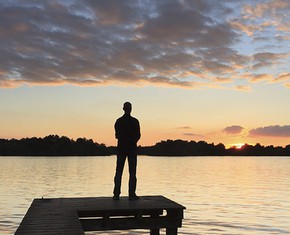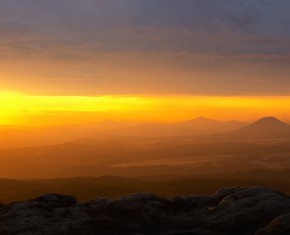The views expressed in our content reflect individual perspectives and do not represent the authoritative views of the Baha'i Faith.
The growth of human civilizations—in essence, the growth of human unity—comprises a deeply spiritual process. When we learn to live together peacefully and productively, we grow, individually and collectively.
When Baha’u’llah revealed the following two statements, he brought this phenomenon to the attention of all humanity:
All men have been created to carry forward an ever-advancing civilization. – Baha’u’llah, Gleanings from the Writings of Baha’u’llah, p. 215.
O ye children of men! The fundamental purpose animating the Faith of God and His Religion is to safeguard the interests and promote the unity of the human race, and to foster the spirit of love and fellowship amongst men. – Ibid.
The growth of society and civilization is inextricably linked to the spiritual and intellectual growth of individual human beings. The growth of one affects, fosters and enables the growth of the other.
As each individual human being grows, that growth provides the basis and tools for developing a larger and better society. As the larger society grows and advances, it becomes an ever-improving matrix for developing a more advanced humanity, as we progress to higher and higher levels of physical and spiritual well-being. This interdependency has formed the linchpin for humankind’s development down through the ages, powerfully demonstrating how humanity differs from the rest of the animal kingdom.
Based on Baha’u’llah’s teachings, the role of every person involves advancing and improving both our physical and spiritual qualities—which enable us to build broader and broader levels of cooperation and unity among people, and to advance the progress of civilization all around the world
Study history and you will see this pattern emerge at various times and in various places. Humans have progressed from the hunter-gatherer stage, to farming by domesticating plant and animal species, to becoming builders of cities, empires and nations. We now use our innate creative abilities to invent the internet, to build planes that fly faster than the speed of sound, and spaceships that travel farther and farther out into our vast universe.
Taking another look at our progress during the Stone Age, which lasted from 2.5 million BCE to about 3500 BCE, can prove fruitful. The development of DNA science and the Human Genome Project in the 1990s have taught us a great deal about the progress of humans and humanity as a whole during those “pre-historic” centuries.
With our current global database of genetic samples, scientists—by looking at the variations in DNA at specific sites in regions, cities, and in some cases, small isolated villages in countries all over the world—have worked backward in time to study and understand earlier generations. One of the more interesting findings: all of us can trace our ancestors back to a common genetic mother who lived somewhere in Africa about 150,000 years ago. While she was our genetic Eve, she was probably not the only woman alive at that time—but instead the only woman whose offspring lived, multiplied, emigrated, and now live all over the world.
About 50,000 years ago, the time had come for humans to move out of Africa and start the next step of ultimately populating the entire world. During the subsequent thousands of years with the hunter-gatherer lifestyle, any one area could only support about 40 people; as the number got larger, a group would break off and resettle in another area, which probably became easier and more likely with each repetition. In addition, DNA science gave scientists the tools to determine what path our ancestors followed after they emigrated from north-central Africa about 500 centuries ago and went on to populate all of the livable continents. The DNA shows that our ancestors probably migrated from Africa to the Arabian Peninsula and then northward to Europe and eastward to Asia, Australia, and the Americas.
Just as the departure from Africa was not predictable, shortly after 8500 B.C.E., another unexpected and major event occurred that would ultimately provide the means to produce a major change in the lifestyle of our ancestors. While their lifestyle of wandering hunting and gathering enabled them to populate all the livable continents, early humans needed a new lifestyle that would enable them to increase the size and efficiency of their groupings, from the 40 or so people limited by their nomadic existence, to unheard-of and even enormous numbers. Our predecessors were about to be motivated to become farmers—to settle down in one place and grow their food.
So our ancestors learned agriculture in the period from about 8500 BCE to 3500 BCE. They slowly figured out how to cultivate wild plants and grasses into wheat, rice, and corn for a ready, abundant and sustainable food source. In the process they changed their lifestyle from wanderers to farmers, and settled in areas which eventually became villages.
Our ancestors not only developed a plentiful food supply by domesticating plants for human consumption and animals for their strength and endurance, but in addition they also domesticated themselves. “To domesticate” is an interesting verb that means “to train someone to live appropriately at home.” In that gradual educational process, our training and education—provided primarily by religion—led us from our previously wild state toward a more educated and more civilized one:
Through education the ignorant become learned, the cowardly become courageous, the crooked branch becomes straight, the acrid and bitter fruit of the mountains and woods becomes sweet and succulent, and the five-petalled flower puts forth a hundred petals. Through education barbarous nations become civilized … The differences caused by education are enormous and exert a major influence. – Abdu’l-Baha, Some Answered Questions, newly revised edition, p. 247.
















Comments
Sign in or create an account
Continue with Googleor